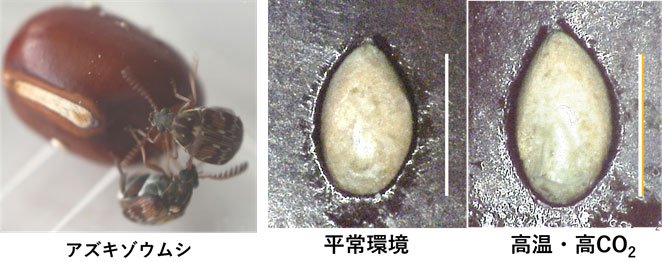Professor Midori Tuda and her research group have discovered that co-infection with Wolbachia enables insect parents to produce larger, fitter sons under high temperature and elevated CO₂ stress.
Endosymbiotic Bacteria Tip the Balance: Bigger Sons for Tougher Times
Points
- Insects often produce larger eggs in response to environmental stress to improve offspring survival. However, the role of endosymbiotic bacteria and sex-specific differences in egg size had remained unclear.
- This study is the first to demonstrate that, under high temperature and CO₂ conditions, insect parents increase the size of male eggs (sons) through co-infection with the endosymbiotic bacterium Wolbachia.
- The finding suggest that endosymbiont-influenced, sex-specific plasticity in egg investment may extend beyond insects -- potentially even to organisms with chromosomal sex determination, including humans, The study also raises questions about why sons, rather than daughters, receive greater investment under stress.
Abstract
In rapidly deteriorating environments, insects often boost their inclusive fitness by producing larger eggs. However, the contribution of co-infection* by endosymbiotic bacteria to this plasticity in egg size had not been previously explored.
This study reveals that insect parents exposed to environmental stress increase egg size through co-infection with Wolbachia strains, but the increase was observed only in male eggs (sons) (Figure 1, right). Larger eggs offer survival advantages, including higher viability and faster development. Early-maturing sons gain a mating advantage, whereas early-maturing daughters may suffer from reduced fecundity and shortened lifespan due to increased mating pressure. As a result, parents may preferentially invest in sons to enhance inclusive fitness under adverse conditions
The research, led by Professor Midori Tuda at the Faculty of Agriculture, Kyushu University, included Siyi Gao (a third-year Ph.D. student at the Graduate School of Bioresource and Bioenvironmental Sciences) and collaborators from Bordeaux Sciences Agro -- Professor Ellies-Oury, Assistant Professor Gonzalez, and Master's student Leroy . Using populations of the adzuki bean beetle (Callosobruchus chinensis, Coleoptera: Chrysomelidae: Bruchinae, Figure 1, left), the team established lines that were coinfected, singly infected, or uninfected with Wolbachia. By conducting oviposition and rearing experiments under high temperature and elevated CO₂ conditions, they uncovered this novel mechanism of sex-specific investment.
These findings demonstrate that Wolbachia infection can enhance host fitness under environmental stress and that parental investment strategies are influenced by the offspring's sex. While sex-specific investment has been reported in a few haplodiploid arthropods, this is the first evidence of such plasticity in a species with chromosomal sex determination -- a group that includes mammals and humans.
The study was published in the international journal Scientific Reports on Wednesday, April 16, 2025.

Researcher's Comment
It was known that parents produce larger eggs in response to environmental deterioration, but the link between endosymbiotic bacterial infection and egg sex had never been explored. By tracking individual eggs through to adulthood, we found that parents exposed to stressful environments produced larger male eggs, boosting their fitness. Interestingly, in the absence of maternal infection with the Wolbachia strains, cytoplasmic incompatibility** occurs -- leading to early offspring death. Since endosymbionts are usually passed from mothers to offspring, it would seem advantageous for them to increase the size of infected female eggs to ensure their survival. However, in this stud, it was male eggs that grew larger, suggesting that the host's benefits outweighed those of the bacteria. The interplay of conflict and cooperation between hosts and symbionts is an exciting direction for further study.
Glossary
* Co-Infection: Infection with multiple strains or species of endosymbionts
** Cytoplasmic Incompatibility: A phenomenon where offspring die at an early developmental stage if the mother is uninfected and the father is infected. Offspring develop normally if both parents are infected or if only the mother is infected.
Paper Information
Journal: Scientific Reports
Title: Wolbachia infection facilitates adaptive increase in male egg size in response to environmental changes
Authors: Leroy E, Gao S, Gonzalez M, Ellies-Oury M-P, Tuda M
DOI:10.1038/s41598-025-96680-6
For Research-related inquiries












 Contact
Contact
 Access Map
Access Map

